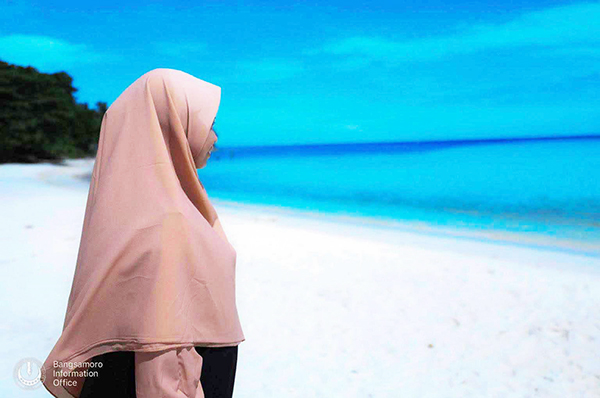CAGAYAN DE ORO CITY – A female Muslim college student defended the wearing of a hijab or headscarf for Muslim women, stressing that it is a religious obligation stated in the Quran, the Islam holy book.
Kath made the remark amid the issue in a prestigious university here where Muslim female college students were allegedly prohibited from wearing hijabs in certain classes and ceremonies by a college department.

A MUSLIM woman wearing a hijab. (Photo courtesy of Abdul Aziz Mama from the Bangsamoro Information Office)
She emphasized the need to respect one’s decision and not generalize all Muslim women as there are others who opt not to wear hijabs.
“We have religious obligations, and we have a choice in that religion, but you, as a human being, that’s your choice if you are going to do your religious obligation. So, let’s not generalize,” Kath, a member of a university-based Muslim organization, said in an interview on Monday, February 5.
During the city council’s regular session on Monday, Councilor Joyleen Mercedes Balaba delivered a special report regarding the complaints of two Muslim female college students about the matter. Balaba received a copy of the complaint-letter from the National Commission on Muslim Filipinos (NCMF) here.
Balaba did not mention the school during her special report but she said that students from Xavier University (XU)-Ateneo de Cagayan filed the complaint when asked to confirm.
The issue also came to light after the XU-Central Student Government (CSG) released an official statement regarding the matter through its official Facebook page last January 18.
The student organization asserted that it is a long-overdue struggle experienced by Muslim female students from the College of Nursing where they accordingly prohibited wearing their hijabs during their Related Learning Experience (RLE) and Capping and Badging Ceremony and there was even no medical-grade hijab offered, accordingly, as an alternative.
It added that a similar issue happened in 2019.
Balaba narrated that one of the complainants was forced to shift to another course because of what happened.
“A scenario that is truly heartbreaking for anyone and for a student at an early age to give up her dream because of this unreasonable and completely unfair school policy,” Balaba, an XU alumna and a registered nurse, said.
It is unreasonable, she stressed, as there were laws that guarantee exercise of religious freedom, citing Section 5, Article 3 of the 1987 Philippine Constitution that states, “No law shall be made respecting an establishment of religion or prohibiting the free exercise thereof,” and Paragraph (e), Section 31 of the Magna Carta for Women that ensures sensitivity of regular schools to particular Moro and indigenous practices, such as the choice of clothing, including the wearing of a hijab.
Department of Health Memorandum 2009-0107 that states that Muslim female workers should be permitted to use their hijab and wear their prescribed mode of dressing inside the premises of healthcare institutions was also cited.
Balaba requested from the city council a committee inquiry and this was backed by other city legislators as the university might not be involved in its implementation.
Councilor Ian Mark Nacaya stressed the need to speak to the entire school system in this city by calling all school administrators and informing them about the laws that may be violated if they do not respect one’s individuality.
On January 23, the XU-CSG posted an update that the university dialogue on the hijab issue was being pursued and it was conducted on February 1. However, the XU-CSG president has yet to disclose what was tackled in the dialogue.
According to the Bangsamoro Information Office, hijab serves an identity of Muslim women that reflects their “modesty and strong beliefs” or “Imaan.” The hijab also shields them from male gaze, particularly from unrelated men.